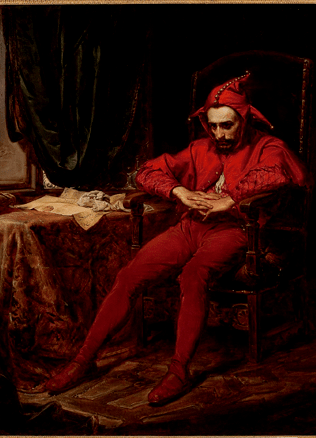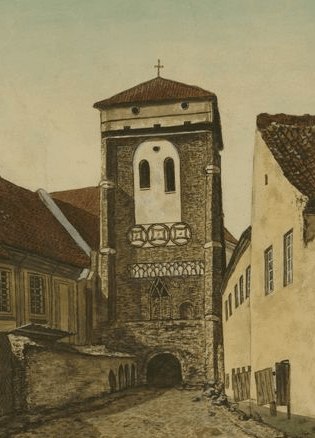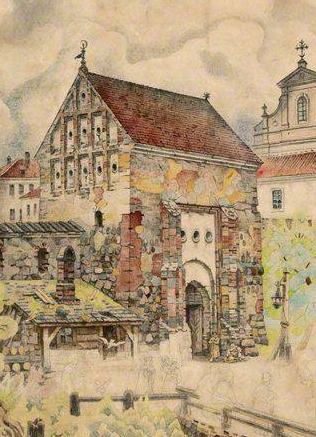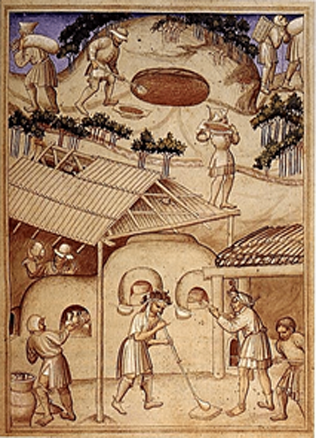A Poetic Dispute between Nicolaus Hussovianus and the “heretics”
Nicolaus Hussovianus (c. 1480 – after 1533) is the author of A Song about the Appearance, Savagery, and the Hunt of a Bison (Lat. Carmen de statura, feritate ac venatione bisonti), composed in 1523 in Krakow. The historical evidence about his life is scarce. Attempts are often made to establish certain biographical data of Nicolaus Hussovianus’ life on the basis of the author’s views expressed in the first person in A Song, disregarding the fact that the figure of the narrator of the poem may not reflect reality but could have been designed for different purposes. The representative of Early Renaissance, Nicolaus Hussovianus is regarded as the first true poet and a strong-minded patriotic citizen of the Grand Duchy of Lithuania. He refers to Lithuania as “our Motherland” and narrates with infinite pride about the beauty of its nature and the traditional hunting customs. Furthermore, he glorifies Grand Duke Vytautas. That said, one should not lose sight of a significant biographical fact related to the poet’s life circumstances. He was the court poet, serving the needs of the nobility and depending on the will of his patrons. It is highly likely that the images of Lithuania’s majesty, portrayed by him in the poem A Song, might have reflected the views held by then his patron Erasmus Vitelius, Secretary to the Grand Duke Alexander Jagiellon, Canon of the Vilnius Episcopate and a diplomat of the Grand Duchy of Lithuania, rather than his own views. In the works written after the death of Erasmus Vitelius, Nicolaus Hussovianus no longer refers to the Lithuanian population as “we.” Instead, he used the phrase “that nation.”
Dangers of Islam and Heathenism
The later works written by Nicolaus Hussovianus are less known to the modern Lithuanian reader. Among them, the following should be mentioned: a short poem The New and famous victory over Turks in month of July (Lat. Nova et Miranda Victoria de Turcis mense Iulio), Life and feats of St. Hyacynth (Lat. De vita et gestis Divi Hyacinthi) a number of shorter pieces of work, published together with the poem A Song as well as the pieces included in the books by other authors. A perusal of his creative work makes it obvious that the topic the author was most interested in was not exploring Lithuania, Vytautas or the hunting customs. His major concern was to highlight the impending dangers that could jeopardise Catholicism, as “the only true” faith.
Among the impending dangers, the geopolital threat of the Ottoman (Turkish) Empire jeopardising all the Christian Europe of those times should be mentioned. Some background information should be given to shed light on the author’s reasoning. The reason why Nicolaus Hussovianus ended up in Rome, in which the idea of creating the poem A Song about the Appearance, Savagery and Hunting of the Bison was born, was that his patron Erasmus Vitelius had been sent there as a representative of the Grand Duchy of Lithuania to negotiate with the Pope the joint actions of the fight against the Turks. In the most famous work by Nicolaus Hussovianus, the Turks are referred to as a terrible disaster, which causes destruction and inevitably inflicts death upon members of other confessions. No analysis of Islam is given by the author; no discussions are held with the supporters of Islam. It is simply stated by the writer that Turks “find it to their liking to kill people professing other religion than Islam.” He also stresses that it is better to die than end up in Turkish captivity. In the short poem by Nicolaus Hussovianus New and famous victory over Turks in month of July (1524, written in one day, under the impression from the victory by Trembowla on July 2, 1524, gained by the troops sent by Sigismundus the Old over the joint army of Turks and Tartars), the magnitude of the plundering and atrocities by the Muslims in the south-eastern parts of the Grand Duchy of Lithuania are described. The following episode stands out among the others by the highest emotional tension permeating it: a man whose family had been brutally killed by invaders, is in utter despair and therefore gives pledge to convert to Islam and profess Muhammad’s faith, if only his wife and children could be brought back to life. Such an incident is interpreted by the author as mere blasphemy, which could only be explained by temporary aberration.
An absolutely negative attitude held by the author toward those professing Islam could be regarded as a standard approach in those times, since such an image of Muslims was prevalent throughout the entire Europe.
However, the poet’s views on any remains of Heathenism make him singular and even exceptional within the overall general context of the epoch. The author strongly dislikes any mention and portrayal of the ancient Gods, which was widespread in the Renaissance art and literature. In his work A Song about the Appearance, Savagery and Hunting of the Bison, he flatly refuses to portray Diana, the Goddess of the Hunt, as would have been usual in a work exploring such a topic. Instead, the author claims that he was worshipping “Christ and the Mother of Christ.” In one of the minor works written by the author, under the title Sacrifice of a black ox, an incident is described which produced an indelible impression upon the author and shocked him. In 1522, when the plague was ravaging Rome, having lost all hope, the citizens of Rome eventually agreed with the proposal of a certain impostor to sacrifice a black ox to the Gods, following an ancient ritual. It is in great shock and revolt that Nicolaus Hussovianus narrates the whole ritual and calls the Romans the descendants of the barbarian Goths who invaded and occupied Rome, rather than descendants of the ancient Romans who were known to have adopted the faith of Christ. Eventually, he even puts forward a suggestion to move the centre of the Catholic Church to the “more distant nations.”
If a church is not ornate, it will attract fewer believers
The most painful topic to Nicolaus Hussovianus was the intimidating (to him personally) teaching of Martin Luther, which started in 1517 and spread quickly throughout Europe. In the work A Song about the Appearance, Savagery and Hunting of the Bison the author compares Lutheranism to a destructive force, jeopardising the Christian civilization from the inside, whereas the danger of the Turks lurks on the outside. The poet gives a warning to the readers that Christ’s Church is weakening “from our own swords pointed against ourselves,” therefore it “falls prey to the ruthless enemy and becomes a toy in the hands of the foe.”
The last of the great works written by Nicolaus Hussovianus is his poem De vita et gestis Divi Hyacinthi (Eng. Life and Feats of St. Hyacynth). The poem shows a change in the author’s priorities, with religious matters coming to the fore in this work. The very choice of the subject-matter is quite significant: descriptions of the lives of the saints were popular in the literature of the Medieval times and were revived later by Counter-Reformation. However, such narrations were not typical of the Renaissance epoch. To make matters even more interesting, the entire second half of the poem is devoted to the polemics with Lutherans. The author provides numerous arguments, which could be useful by his imaginary reader in real life – from peaceful persuasion, relying on the longevity of the Catholic tradition and the authority of the Fathers of the Church, up to open attack, accusing the Lutherans of selfishness and moral promiscuity (this is supposedly the reason why they closed down monasteries).
In one episode of the poem, the rise and fame of Martin Luther is even compared to the advent of Antichrist.
Of significant interest is the author’s discussion with the imaginary opponents regarding church decoration, worshipping the images of the saints, organ music and similar aspects of traditional religious practice. The author is believed to have heard the rumours about the rampage of the first iconoclasts (those who object to the use of sacred images in religion and destroy them) in Germany and Switzerland, therefore he simply refers to the activity of such impostors, depriving churches of their possessions, as literal daylight robbery. He continues to explain that all the items of adornment in the churches are insignificant as such. However, they help to attract simpletons and children, so they fell into a habit of attending church and got used to the matters of faith. Eventually, he gives the following warning: if impoverished churches lose their attractiveness, it could happen that over time, the grandchildren of the present Catholics would be taught by that other nation, one that continues worshipping grass-snakes and the river-gods, and other kind of madness that warrants no further comment, and lives “in close proximity to us.” These comments were made having Lithuania in mind. It is obvious that the later creative work by Nicolaus Hussovianus is totally devoid of the patriotism, which is so very apparent in his work A Song about the Appearance, Savagery and Hunting of the Bison.
Literature: Tomas Veteikis, „Mikalojus Husovianas epochų ir tapatybių sankirtose“, in: Mikalojus Husovianas, Raštai, Vilnius: LLTI, 2007.
Eglė Patiejūnienė



